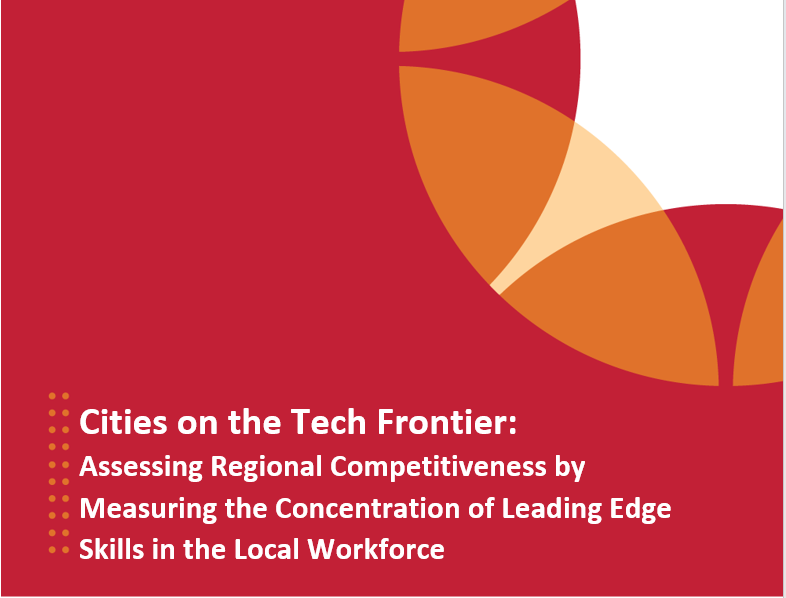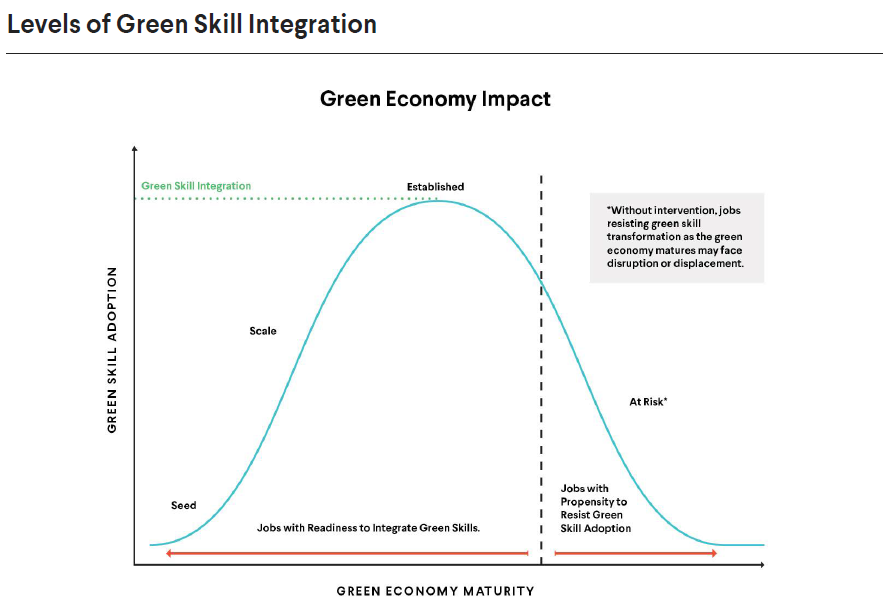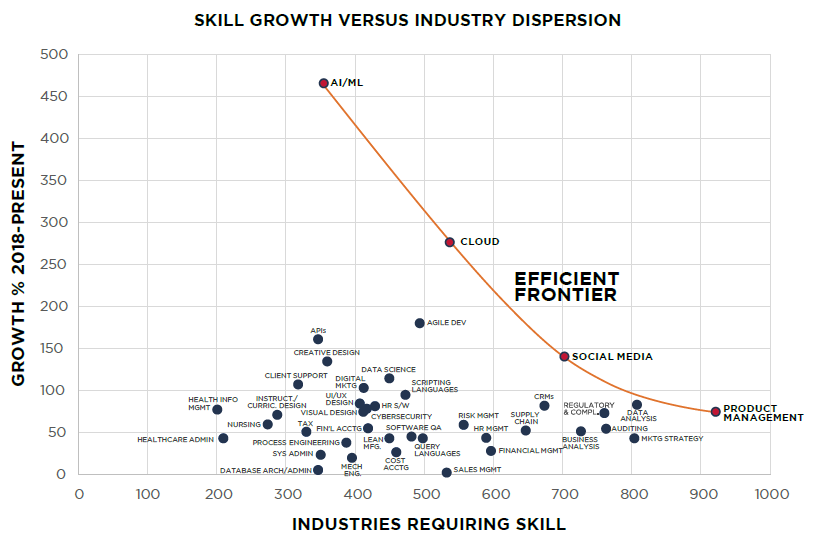Research
Selected research published by the Burning Glass Institute independently or in partnership with other leading workforce innovation and higher education organizations

Data Science Is for Everyone
The term 'data science' often conjures images of people hunched over laptops furiously typing out lines and lines of abstract computer code, yet the reality of today's career landscape offers a far different picture. From Wall Street to Main Street, work is evolving to the point that data skills are now essential competencies across a surprising range of jobs, industries, and educational levels.
American industry runs on data, and an increasing number of workers now find that skills in data collection, analysis, and visualization are becoming critical to their careers. The message to policymakers and education leaders is clear: data science skills are vital for securing quality jobs. For states aiming to foster economic growth, investing as early as in K-12 education to provide high-value data science skills is key to unlocking a new era of worker mobility in jobs and sectors not historically thought to be “data intense.”
The Burning Glass Institute and ExcelinEd partnered to document the explosive rise in demand for data science skills to help workers, learners, and education leaders understand these trends. What we found not only reinforces the need for strong investment in data science skill attainment, but also shows just how extensive its reach now extends into the 21st century American workforce.

Skills-Based Hiring: The Long Road from Pronouncements to Practice
For many employers in recent decades, adding college degree requirements seemed an efficient filter. More proxy than direct measure, degrees were perceived as indicators of persistence, of foundational skill, and of general capability. For hiring managers who themselves had traveled that cursus honorem, it seemed only natural to value the implied endorsement of college admissions officers and the presumed rigor of the college experience as an effective way of separating the wheat from the chaff.
Shortages have a way of inciting challenges to tired assumptions. In the tight labor market that emerged leading up to the pandemic and that returned during the recovery, hiring has become a key operational challenge, causing employers to reevaluate their requirements. In the face of these pressures, it has become increasingly difficult to justify a filter that summarily disqualifies the roughly two-thirds of Americans (62 percent) who lack a degree. At the same time, a growing focus on equity commitments has caused employers to question practices that likely contributed to suppressing broader representation.
Amidst this backdrop, the Skills-Based Hiring movement has gained momentum, as more and more employers committed to stripping degree requirements from their postings, replacing the proxy of a college degree with actual evaluations of candidate skill. An initial flurry of high-profile pronouncements by private-sector and government employers alike has become a blizzard. But do these proclamations result in a real increase in access for workers?

America’s Tech Hubs Are Multiplying
The Burning Glass Institute recently worked with the Wall Street Journal to analyze the tech talent base of each US city in order to find the ones with the greatest concentrations of cutting-edge skills. Across the full range of skills within the tech workforce, there are some at the frontier of advances in technology – those that are growing fastest and commanding the highest wage premiums. Cities with large concentrations of these Frontier Skills stand to define the future tech talent landscape.
A key finding of this work was that America’s storied tech hubs – Seattle, Silicon Valley, San Francisco – remain dominant. Yet our research reveals another important phenomenon. These cities aren’t just magnets for talent. They have also become incubators for and sources of talent. Even as they strengthen their lead, they are giving rise to a talent diaspora that is propelling a new generation of challengers: already thriving tech centers like Austin, San Diego, and Portland, as well as emerging contenders like Sacramento, Boise, Bentonville, and Boulder.
In fact, our research finds that the cities with the greatest concentrations of Frontier Skills are also those with the greatest concentrations of diasporic talent from the West Coast tech giants.

Cities on the Tech Frontier
What drives regional economic growth in the knowledge economy? What is the best location for new and growing firms dependent on a highly skilled workforce? Where should educators, policy makers, and industry invest to advance their city’s prospects as a rising tech hub? In an environment of rapid technology change, growing utilization of advanced artificial intelligence, and fluid work formats, conventional approaches to answering these questions miss many of the contours of regional competitiveness. Traditionally, a sector’s regional competitiveness has been measured by the size and projected growth of the industry’s workforce, with typical worker earnings used to impute output. However, these measures do not adequately capture the quality of the workforce. Skills are the yardstick of competitiveness in the human economy. A city might have a large tech workforce but, if that workforce is largely oriented toward legacy technologies, the city will soon find itself losing out to places with a greater investment in leading edge skills. But how can it track these dynamics before it has already lost its edge? Assessing the quality and competitiveness of the workforce requires innovative metrics of skill concentration.
In an analysis of regional skill concentrations, the Burning Glass Institute has identified several forces that offer insight into the likely shape of future growth. Utilizing real time labor market data, including the Burning Glass Institute’s database of the career histories of over 65 million US workers and Lightcast’s database of US job postings, we analyzed concentrations of the highest growth, highest value tech skills and occupations in order to understand which cities are out front, which are on the rise, and which are falling behind. Those concentrations vary widely across the nation, with some regions far better primed than their peers for investment at the frontier of America’s tech- and data-enabled economies.

Growing Quality Green Jobs
Combating climate change and the ripple effects of its impact is one of the major imperatives of our time. As extreme weather, resource shortages, and other challenges worsen, the U.S. economy is gradually shifting in response. While demand is increasing for well-known green job roles such as solar photovoltaic installer, environmental scientist, and electric vehicle technician, there are currently only 900,000 estimated green jobs within the United States, representing just 0.6% of the workforce. They also represent sectors that lack critical representation from the populations that climate change is hurting the most: people from low-income communities, people of color, and people from rural areas.
Indeed, it’s becoming increasingly clear that our country faces multiple, interrelated climate challenges. A transition to a green economy is not happening quickly enough to minimize significant health hazards brought on by climate change, nor is it building equitable resilience against devastating and ongoing natural disasters impacting communities nationwide. Emerging green jobs that could provide a foundation for change—particularly those that demand science, technology, engineering, and math skills—tend to require at least a bachelor’s degree and lack entry-level roles or clear pathways for people from underserved and underrepresented populations. A truly just transition to a green economy requires solutions that not only limit the root causes of our warming planet but also lead to accessible, equitable, and quality jobs for a sustainable future…

Making the Bachelor’s Degree More Valuable
The bachelor’s degree is facing an identity crisis.
In the last year and a half, Maryland, Pennsylvania, and Utah have stopped requiring a four-year degree for most jobs in their state governments. The private sector, too, has moved toward skill-based hiring, with Delta, General Motors, Google, Apple, and IBM, among others, dropping the B.A. prerequisite for many positions. Even the federal government is urging its agencies to rely on job-seekers’ skills rather than the sheepskin to fill vacancies.
As we show in this paper, the B.A. remains a valuable commodity in the job market. But colleges and universities can no longer coast on the historical value of the four-year degree to enroll students going forward. The onus is on institutions to make the B.A. more valuable in a marketplace where it faces competition from microcredentials, industry-based certificates, and increasingly well-paying jobs that don’t require a four-year degree.

2023 Skills Compass Report
Our report on strategic skills planning for upskilling and reskilling the workforce.
For many years we’ve been observing that jobs and organizations have been trending towards disruption, upheaval, and accelerated change. COVID-19 has dramatically increased the speed at which technology is fundamentally changing business. One major effect on this is on the rate of disruption for jobs. The World Economic Forum predicts that 85 million jobs will be displaced by 2025, which means they just simply won’t exist due to algorithms or new technologies. More shockingly, 40% of what organizations now deem core skills will change by 2025
The 2023 Skills Compass Report has been created to help leaders build meaningful learning programs and skill planning strategies by helping define and prioritize skills requirements by understanding the intersection of time to skill, skill value, and skill longevity, inform their build vs. buy learning strategy to design more effective learning programs, drive digital literacy to upskill and reskill talent, and justify the ROI for specific skills to help leaders resource strategic learning initiatives.

How Skills Are Disrupting Work
Our report on the transformational power of fast-growing, in-demand skills.
In 2021, one in eight job postings featured four skill sets that share two startling common features. These high-demand sets of skills—in Artificial Intelligence/Machine Learning, Cloud Computing, Social Media, and Product Management—are both among the country’s fastest growing and the economy’s most rapidly spreading into new industries. In some industries, skills from these sets are represented in up to a third of all job postings. They are showing up in surging numbers across the workforce, affecting an ever-widening diversity of jobs and industries and, together with similar skill sets, are entirely transforming work as we know it.

Shifting Skills, Moving Targets, and Remaking the Workforce
Our analysis of 15 million job postings illuminates the future of work
Discussions about the job market usually focus on jobs created and destroyed. But even in the most tumultuous times, that is not what most workers or most business experience. Jobs do come and go, but even more significantly, jobs change. For the vast majority of workers, their job is much less likely to go away than to evolve into something new…

HBR: Skills-Based Hiring Is on the Rise
Two decades ago, companies began adding degree requirements to job descriptions, even though the jobs themselves hadn’t changed. After the Great Recession, many organizations began trying to back away from those requirements.
To learn how the effort is going, the authors studied more than 50 million recent job announcements. The bottom line: Many companies are moving away from degree requirements and toward skills-based hiring, especially in middle-skill jobs, which good for both workers and employers. But more work remains to be done.
